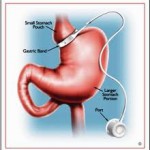
While the results are limited to two years’ follow-up after surgery, the analysis provides further evidence supporting medical procedures to address the obesity epidemic. At least 2.8 million people die each year from being overweight or obese, which raises risks of diabetes, heart attacks and strokes. This meta-analysis provides comprehensive evidence that compared with non-surgical treatment of obesity, bariatric surgery leads to greater body weight loss. The evidence beyond two years of follow-up, in particular on adverse events, cardiovascular diseases and mortality remains unclear.

Obesity is “one of the greatest public health problems in industrialized countries,” according to the authors of the study. According to current guidelines, bariatric surgery can be considered for people with a body mass index of at least 40 or a BMI of 35 for those with an obesity-related disease. Body mass index is a measure of body fat calculated using a person’s height and weig
Weight loss surgery helps people with extreme obesity to lose weight. It may be an option if you cannot lose weight through diet and exercise or have serious health problems caused by obesity. There are different types of weight loss surgery. They often limit the amount of food you can take in. Some types of surgery also affect how you digest food and absorb nutrients. All types have risks and complications, such as infections, hernias, and blood clots.
To know more about Weight Loss Surgery in India please visit this link : http://safemedtrip.com/medical-services/weight-loss-surgery-in-india.html

 Click to WhatsApp
Click to WhatsApp +91-9899993637
+91-9899993637



